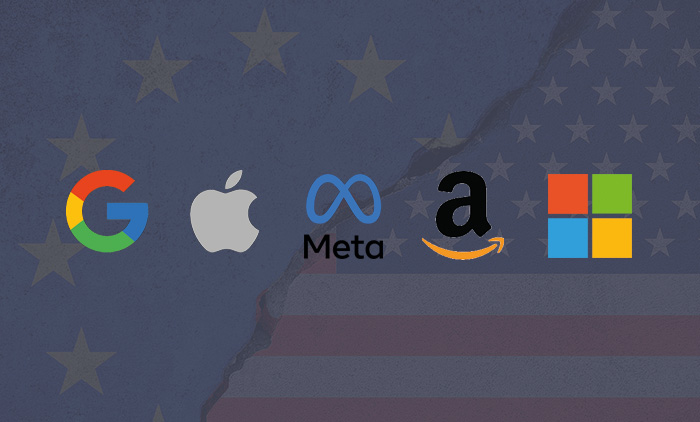Interviews / Europe, European Union, NATO
29 September 2025
Trump, Brussels and the Digital Giants: A Confrontation Under Constraints

The re-election of Donald Trump has revived transatlantic tensions over digital regulation. A new showdown appears to be looming between Washington and Brussels since Donald Trump called for the repeal of European regulations in the digital field. By attacking European norms and regulations, the American president denounces what he sees as European protectionism obstructing the free expansion of major American digital multinationals (GAFAM). What is at stake in Donald Trump’s statements? How have Europe and the GAFAM reacted? Insights from Charles Thibout, associate researcher at IRIS, lecturer in political science at Sciences Po Strasbourg and researcher at the Sociétés, Acteurs, Gouvernement en Europe (SAGE) laboratory.
What are Donald Trump’s positions regarding European digital regulations? What do the United States reproach the European Union for, and is this justified?
Donald Trump stands in the historical continuity of the economic and foreign policies of successive US administrations. His objective is to remove barriers to the commercial expansion of American digital multinationals, and European regulations are identified as just that: obstacles.
At the same time, legislation such as the Digital Services Act (DSA) is attracting particularly critical attention from the current White House tenant. This legislative instrument is not only seen as a censorial device, designed to counter the spread of discourses that have traditionally favoured the rise to power of nationalist and identitarian right-wing movements — as in Trump’s election and re-election (racism, xenophobia, homophobia, masculinism, anti-intellectualism…) — but it is also regarded by the administration as a tool for containing the United States economically; in other words, protectionism.
The fact is that Europe’s regulatory ambitions are rooted in a context of deep mistrust among European populations towards their political leaders, as demonstrated by the powerful social movements that have emerged in recent years — not without insurrectionary tendencies, as in the case of the Yellow Vests. The goal of political stability sought by Europeans through censorial instruments such as the DSA — which imposes unprecedented rules of diligence, monitoring and content removal, on this scale, on digital platforms — directly collides with the imperialist mission the American administration assigns to these companies. Hence the power struggle between Europeans and Americans, whose origins go back to the Obama presidency.
In the face of this threat from the American president, how has the European Union reacted and what means does it have at its disposal to respond?
The European Union theoretically has a sufficiently robust legislative and regulatory arsenal if, perchance, it sought to tighten its control over the activities of the GAFAM in Europe. It could even, under current law, virtually exclude them from the European market — by activating provisions drawn from competition law in the broad sense, or from personal data protection, for example.
However, it is unlikely that matters will escalate into such a phase of confrontation. Certainly, the European Commission — as well as national regulatory agencies in member states (such as the CNIL or the Competition Authority in France) — has in recent years tended to impose fairly heavy financial penalties on these companies. Thus, on 5 September, the European Commission fined Google another €2.95 billion for abuse of a dominant position in the online advertising sector. Nevertheless, this type of ruling should perhaps be seen more as the latest in a series of “showcase actions” by European institutions, periodically aimed at re-legitimising themselves, than as a genuine attack on these companies. The European Commission is not inclined, given its history, to antagonise American companies on which it has relied to build its legitimacy and independence vis-à-vis the member states.[1] Likewise, national regulatory agencies, which have been shaped in opposition to the “policeman” image associated with central administrations, aim less to thwart the expansionist ambitions of these firms than to assert their role as facilitators, “educators” and business enablers in the service of companies, whatever they may be.[2] Once again, sanctions can only be understood in a context where public opinion pressures these institutions to appear tough towards these multinationals. They are therefore the exception, not the rule.
If one ventures into conjecture, it is highly likely that European institutions (of both the Union and the member states) will more or less comply with American demands, while trying to save face. We may therefore see new sanctions, or even new legislative measures — staged to showcase the “responsiveness” or even “inflexibility” of European authorities — but it is unlikely that these will result in prohibitive constraints on the expansion of these companies’ activities in Europe. All the more so as the democratic argument underpinning some of these actions (for example, “the GAFAM accelerate the spread of illiberal discourse”) is on the verge of falling into obsolescence, as the axiological principles of nationalist and identitarian right-wing movements increasingly permeate Europe’s centres of power.
In this context, what stance do the GAFAM adopt towards Trump on the one hand and the European Union on the other?
For the time being, and since his re-election, American digital multinationals have multiplied their signs of allegiance towards the Trump administration. As Max Weber (1864–1920) once pointed out: “capitalism requires bureaucracy.” This general rule still applies in the digital age, and American multinationals need political power and administration to defend their interests, both at home and abroad. However, it should be noted that despite the genuflections of their leaders, digital multinationals have been built around personnel largely aligned with the Democratic Party’s positions, particularly on social issues (the place of women in society, tolerance towards religious and sexual minorities, positive views on immigration…). It is therefore legitimate to wonder whether a rift (already latent) might emerge between the leadership and their base, in the face of the Trump administration’s reactionary moves.
The same applies to their relations with European political, administrative and economic elites. The GAFAM, with varying degrees of success and zeal, have engaged in a process of normalising their relations with European leaders, through forms of cooperation reaching even into the heart of government machinery.[3] Their institutional representation teams have built up expertise, recognition and a degree of respect among Europe’s power elites. The alignment of their US headquarters with Trump’s aggressive policy could place them in an inextricable situation. It will therefore be necessary to observe closely how relations between these firms and European power spheres are reconfigured. While keeping in mind that Europe itself tends towards alignment with the positions of the American administration — which could facilitate the adaptation of the firms’ local teams. Some recent liberties taken by certain companies with regard to the General Data Protection Regulation (GDPR) suggest that they are already acknowledging the political shift in Europe. We should therefore expect less a confrontation than a recomposition of relations between the GAFAM and European political and bureaucratic institutions. The existing forms of cooperation are unlikely to disappear, but rather to take new forms, more in line with the evolving ideological and political frame of reference of Europe’s ruling elites.
[1] Sylvain Laurens, Les courtiers du capitalisme. Milieux d’affaires et bureaucrates à Bruxelles, Marseille, Agone, 2015.
[2] Antoine Vauchez (ed.), Le moment régulateur. Naissance d’une contre-culture de gouvernement, Paris, Presses de Sciences Po, 2024.
[3] See Charles Thibout, Google, une entreprise d’influence ? Indigénisation, normalisation et politisation d’une multinationale du numérique en France, doctoral thesis in political science, Université Paris 1 Panthéon-Sorbonne, 2024.

